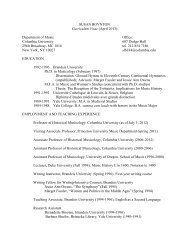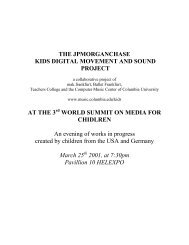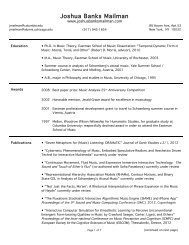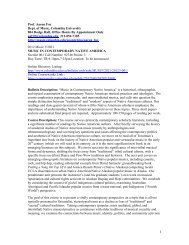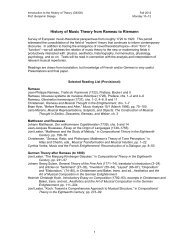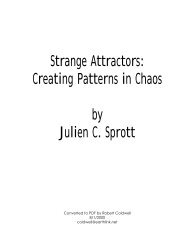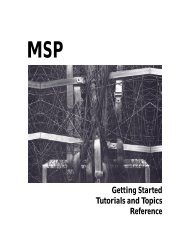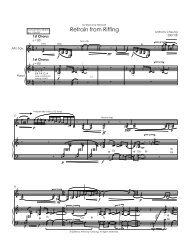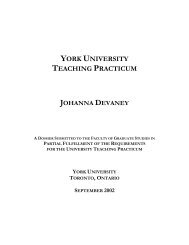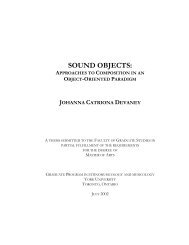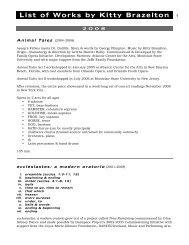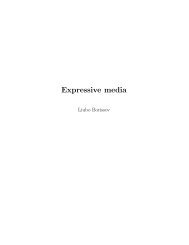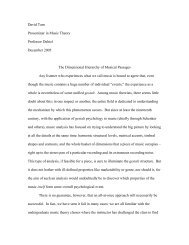Text, including the two scores - Columbia University Department of ...
Text, including the two scores - Columbia University Department of ...
Text, including the two scores - Columbia University Department of ...
You also want an ePaper? Increase the reach of your titles
YUMPU automatically turns print PDFs into web optimized ePapers that Google loves.
aes<strong>the</strong>tic properties <strong>of</strong> a work must have been determined by <strong>the</strong> particulars <strong>of</strong> a machine, not by <strong>the</strong> intellectual or creative effort <strong>of</strong> <strong>the</strong> composer or artist. The frustrating problem, <strong>of</strong> course, is that this view is not necessarily inaccurate. The aforementioned technological paths <strong>of</strong> least <strong>the</strong><br />
do lead a novice, uninspired, or lazy artist to exactly that state <strong>of</strong> not manipulating, but <strong>of</strong> being manipulated. Of course every composer will be guided by <strong>the</strong> means in front <strong>of</strong> him or her; my hope is merely that, by creating my own tools, I will have more say in <strong>the</strong> result than ano<strong>the</strong>r human designer. resistance<br />
this commercially-encouraged mystical construct leads to a deliberate misuse <strong>of</strong> <strong>the</strong> term ‘power’. ‘Power’ has a specific meaning as Similarly,<br />
to computers, describing <strong>the</strong> range <strong>of</strong> tasks that a computer can, for lack <strong>of</strong> a better term, ‘do’. Since <strong>the</strong> formulation <strong>of</strong> <strong>the</strong> Turing Machine in 1937 as a descriptor <strong>of</strong> logical processes, <strong>the</strong>re has been no increase in computer power. Speed, on <strong>the</strong> o<strong>the</strong>r hand, has increased exponentially, and brought applied<br />
<strong>the</strong> time required to complete a computational task. Yet new devices or computer chips are popularly portrayed as increasing in power, directly emphasizing that <strong>the</strong> newer and faster your machine, <strong>the</strong> more mystical power it contains. This helps to negate digital work (artistic and o<strong>the</strong>rwise) that is not down<br />
on <strong>the</strong> newest and most expensive technology, as (falsely) more ‘supernaturally’ impotent than its more powerful descendants. Fortunately, <strong>the</strong> made<br />
artistic and techno-political involvement <strong>of</strong> <strong>the</strong> DIY/hacker scene, combined with its increasing incorporation into mainstream art narratives, has helped challenge this assumption in elegant and beautiful ways that not only revalue previous (and more open) technologies, but also restore authorship to<br />
growing<br />
63



